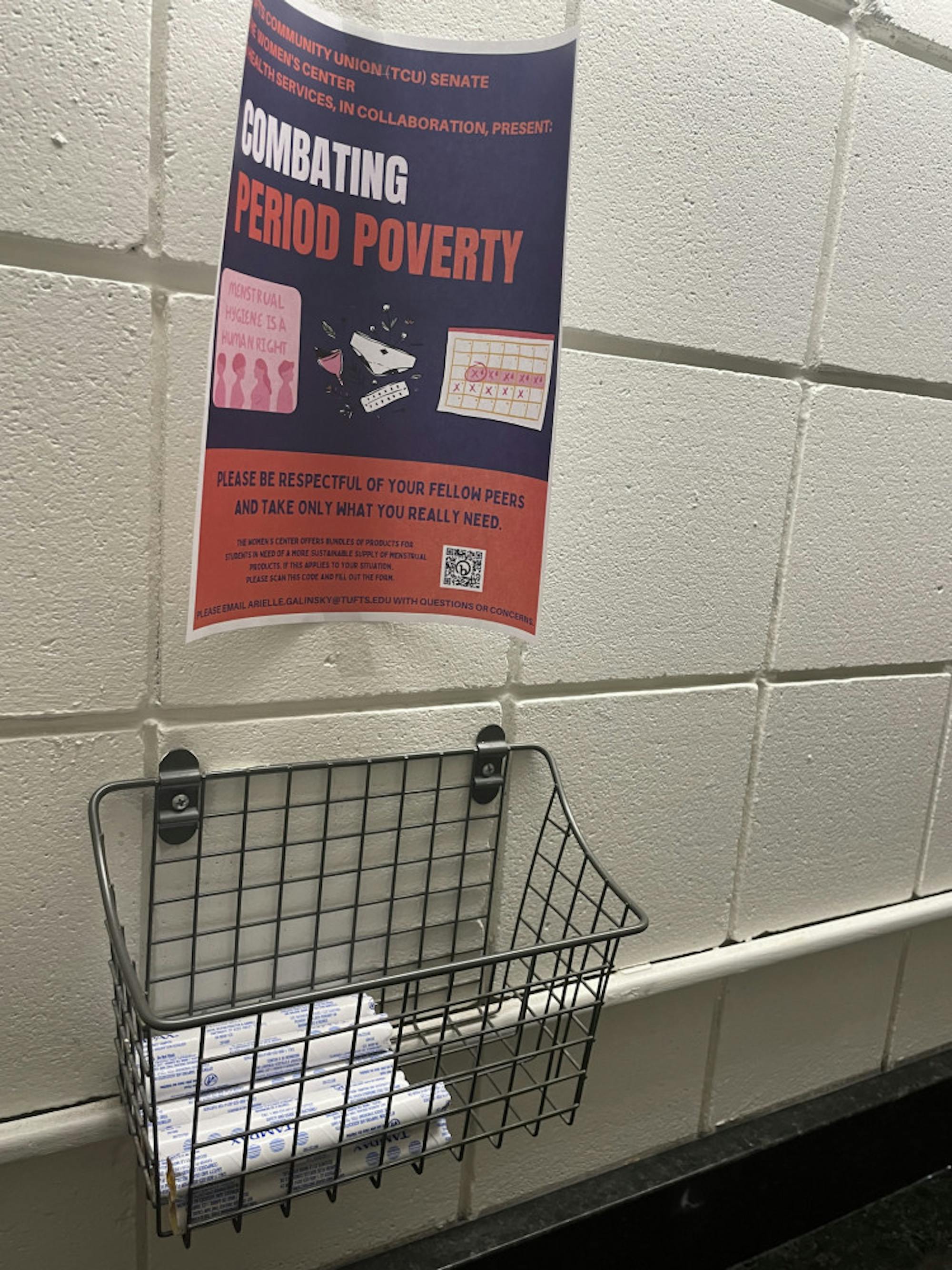A new TCU Senate initiative is bringing free tampons and pads to bathrooms across campus.
TCU Vice President Arielle Galinsky, a junior, worked to bring the Menstrual Product Project to fruition. She said the goal of the project is to “provide a sense of menstrual equity,” noting that many undergraduates and graduates are concerned about the lack of access to menstrual products across Tufts campuses.
“There needs to be an easy way for students to be able to access these products to reduce the barrier and ensure that we can achieve menstrual equity,” Galinsky said. “Otherwise, many students on campus would not be able to afford these products. … No one should have to jeopardize their hygiene or menstrual hygiene because of an inability to financially pay for these resources.”
Right now, free menstrual products are being placed in bathrooms in Tisch Library, the Tisch Sports and Fitness Center and the Campus Center, with plans to expand the program to Olin, Dewick and Carmichael dining halls. Products are placed in differing amounts in female, male and gender neutral bathrooms.
“When I’ve said we are putting them in male identifying bathrooms, sometimes I get looks,” Galinsky said. “But the truth is, there are some menstruators who are male identifying. And we have to ensure that this access is not just slanted towards one side. … We have to make sure it’s equitable.”
PERIOD, a student advocacy group working for menstrual equity, has lobbied the TCU Senate to offer free menstrual products for more than a year.
“In April 2021, we organized a schoolwide petition to place menstrual products in bathrooms on the Medford campus, which ended up garnering over 340 signatures and 20+ endorsements from Tufts organizations,” the PERIOD executive board wrote in an email to the Daily. “We were in contact with TCU members at the time and helped revitalize the discussion about providing easy access to menstrual products in public places on campus.”
PERIOD’s president, senior Isha Vazirani, said the TCU initiative “makes a huge impact.”
“It's really inconvenient to go to the bathroom and realize that you’ve got your period randomly, or it’s late, and you don’t have menstrual [supplies] on you,” Vazirani said. “You either have to go out and awkwardly ask someone [for supplies], or you have to walk back home and then deal with it, [and] miss class. … So it definitely saves you time and, to some extent, embarrassment.”
Vazirani supported putting menstrual products in gender neutral and male-identifying bathrooms.
“Recognizing that … people who aren't female-identifying menstruate … goes a long way to help end stigma,” she said.
Galinsky said that the current funding for the products comes through a three-way collaboration between the TCU Senate, Tufts Health Service and the Tufts Women’s Center. Each organization donated $1,000, which Health Service then used to buy menstrual products in bulk at reduced cost.
“We have two student workers who are constantly monitoring and putting out the menstrual products as well as checking the inventory,” Galinsky said. “I can’t say for certain how long that $3,000 is gonna last, because right now we're still figuring out what the need is and seeing how students react to it. Then I think it will become more clear as we’re able to continue.”
Galinsky believes that funding for supplies should come directly from the university, noting that TCU was able to form an administrative committee focused on menstrual products in collaboration with the president’s office.
While the committee has not met yet, Galinsky has said its goal is to create “a long term sustainable supply of menstrual products.” She believes that menstrual products should be treated like normal bathroom supplies, being put into every bathroom just like toilet paper and soap.
“The hope of this [initial] meeting is to be able to figure out, how can we budget this into university funding, so that we can put it in every single bathroom on campus … and so we’re not putting burden on student workers who feel like it’s on them to ensure that this access is made available,” Galinsky said. “My hope is that it can be in next year’s budget.”






